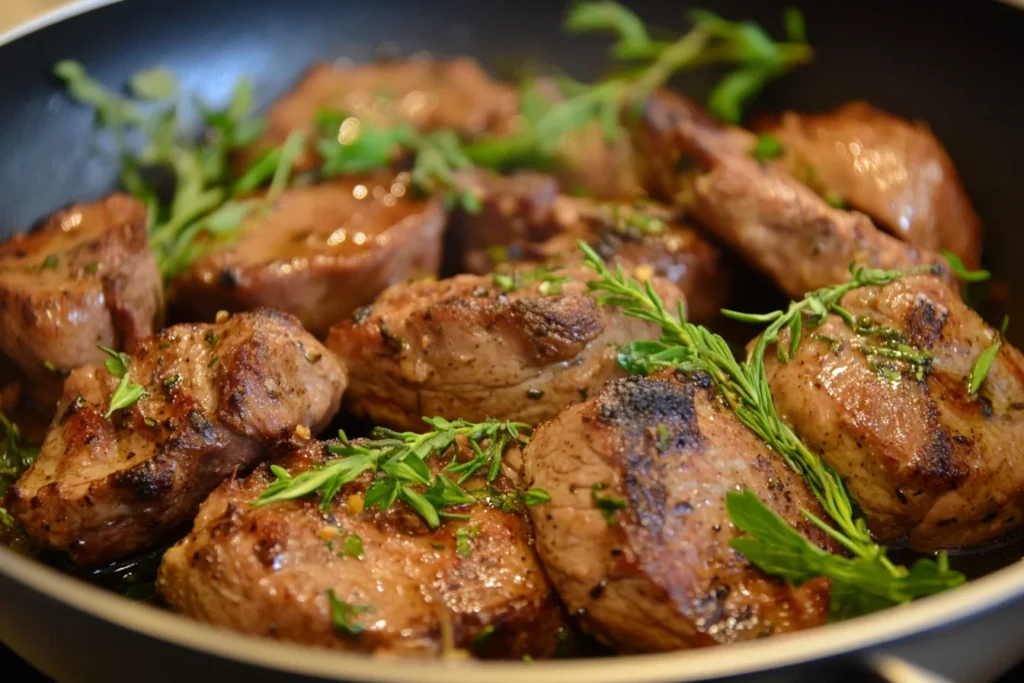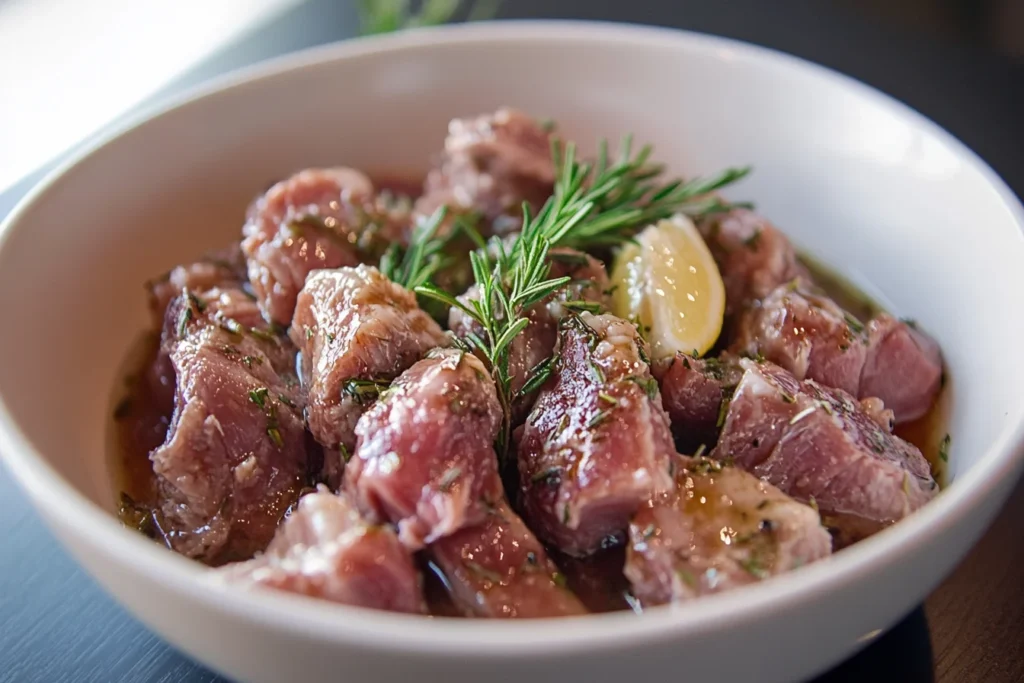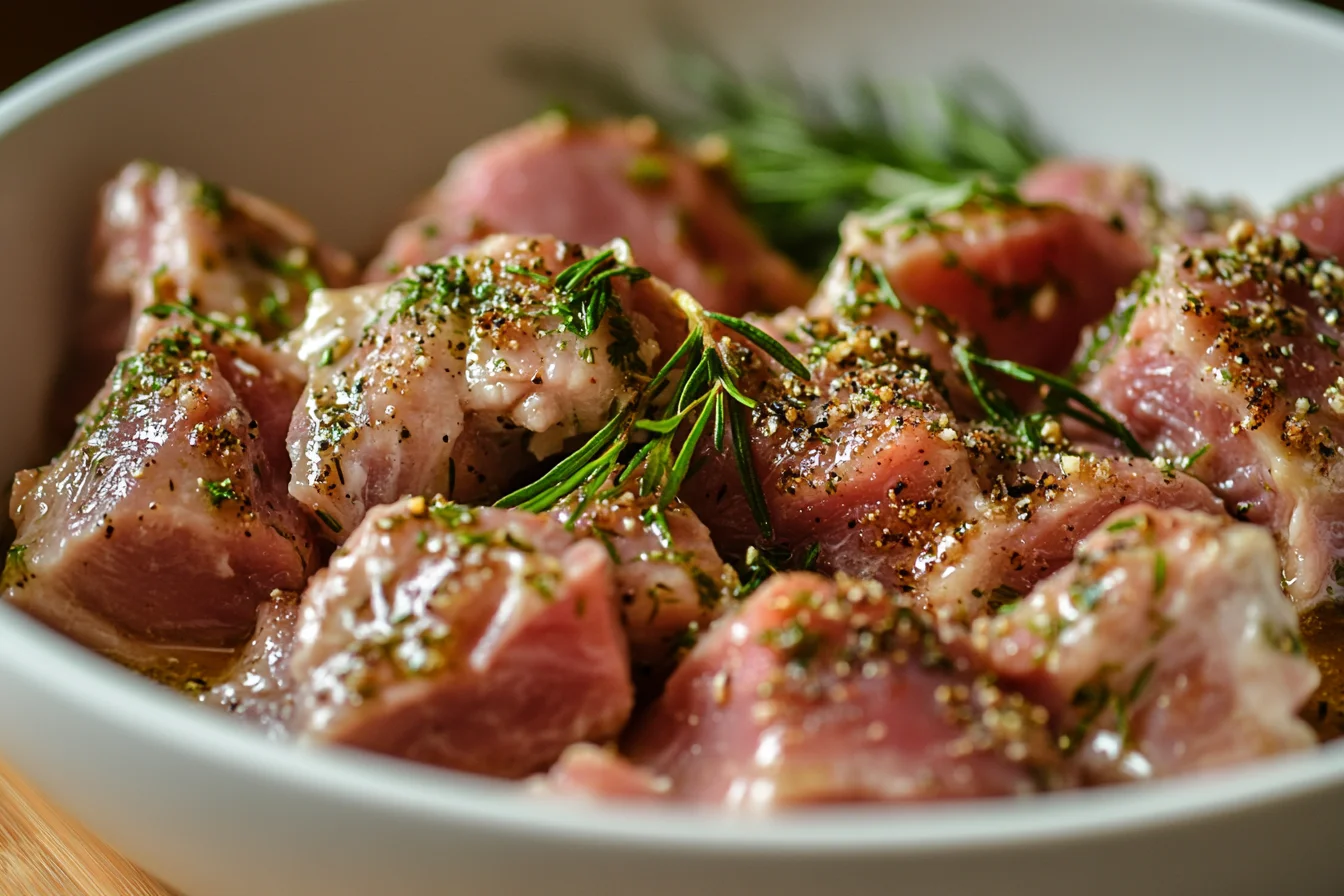How Do You Make Wild Turkey Not Taste Gamey? Wild turkey, for all its nutritional value and lean protein, often intimidates cooks due to its distinct flavor. Many people describe it as gamey, which can be unappealing if you’re not accustomed to it. Fortunately, with the right preparation techniques, you can significantly reduce the gamey taste and create a more enjoyable dining experience.
In this comprehensive guide, we’ll walk you through everything you need to know about how to make wild turkey not taste gamey. You’ll learn essential tips and tricks for preparation, seasoning, and cooking that make wild turkey delicious for everyone at the dinner table.
Table of Contents
Understanding the Gamey Flavor in Wild Turkey
Wild turkeys are not like their farm-raised counterparts. Their diet, lifestyle, and muscle structure contribute to a stronger, sometimes gamey taste. Gamey flavor often refers to an earthy, strong, or musky profile. The good news is that you can minimize this flavor through different techniques. Understanding what makes wild turkey taste the way it does helps you make adjustments to achieve a more familiar, savory taste.
One of the main reasons wild turkey has a gamey flavor is because of its diet—it feeds on a variety of natural foods, including insects, plants, and seeds. This diet influences the taste of the meat, making it more robust. Therefore, preparation methods that help neutralize these distinct tastes are key to making wild turkey more palatable.
A good starting point is understanding how different preparations can affect the taste and texture. You can soak the turkey, brine it, or use a marinade to draw out some of those stronger, earthy flavors. Additionally, proper cooking techniques can make a significant difference.
How Do You Make Wild Turkey Not Taste Gamey?

1. Soak the Wild Turkey in Buttermilk or Saltwater
One of the best ways to reduce the gamey flavor is to soak the wild turkey in buttermilk or saltwater. Buttermilk, in particular, is effective because it breaks down the proteins and neutralizes the strong taste.
- Buttermilk Soak: Submerge the turkey in buttermilk and let it sit for at least 12 hours. The acid in the buttermilk works wonders in mellowing out the gamey flavor.
- Saltwater Brine: A saltwater solution helps to draw out the blood, which is a major contributor to the gamey flavor. Mix ¼ cup of salt per gallon of water and let the turkey soak for 8-12 hours.
Adding aromatics to the brine—like bay leaves, garlic, and peppercorns—can also help mask some of the strong flavors while adding pleasant notes to the meat.
2. Marinate with Strong Flavors
Marinades can add lots of flavor and help eliminate the gamey undertones in wild turkey. You should use a marinade that contains acidic components like lemon juice, vinegar, or yogurt. Acid helps tenderize the meat and mask the wild flavor.
- Best Ingredients for Marinating Wild Turkey:
- Lemon juice or vinegar
- Yogurt (which also tenderizes the meat)
- Fresh herbs like rosemary, thyme, and sage
- Olive oil for moisture
- Spices like paprika, garlic powder, and cumin
A flavorful marinade should sit for at least 4-6 hours, or even overnight for the best results.
3. Use Proper Cooking Methods
The way you cook your wild turkey also plays a significant role in minimizing its gamey flavor. Overcooking can make the meat tough, which in turn amplifies any unpleasant tastes.
- Slow Cooking: Cooking the turkey at a low temperature for a longer time can help break down the connective tissue, making it tender and less gamey.
- Braising: Braising in a flavorful liquid (such as broth, wine, or a combination) helps infuse the meat with additional flavors and reduces the gamey taste.
- Smoking: Smoking wild turkey allows for an infusion of smoke flavor, which can mask gamey notes. Applewood or hickory chips work well to add a subtle sweetness.
4. Use Strong Seasonings
Another great way to make wild turkey taste less gamey is to use robust spices and seasonings. Seasonings with bold flavors can overpower any gamey taste.
- Recommended Spices:
- Garlic Powder: Enhances overall flavor.
- Smoked Paprika: Adds a smoky sweetness.
- Cumin: Provides warmth and balances the earthiness of the meat.
- Chili Flakes: Adds heat, which can help tone down the gaminess.
Don’t be afraid to use strong seasonings—wild turkey can handle it, and it’ll help create a more balanced flavor profile.
Combining Techniques for the Best Results
To get the best results when cooking wild turkey, it’s often best to combine several techniques. Start with a buttermilk soak to draw out some of the gamey flavors. Follow that with a marinade made from acidic ingredients like lemon juice or vinegar, herbs, and spices. After soaking and marinating, you can then choose the best cooking method for your meal—slow cooking, braising, or smoking.
This comprehensive approach helps ensure that the meat is tender, juicy, and flavorful without the overpowering gamey taste. Additionally, you can experiment with different marinades and seasoning combinations to find a flavor profile that works best for your taste preferences.
Detailed Step-by-Step Guide to Preparing Wild Turkey

Step 1: Field Dressing and Initial Cleaning
Proper field dressing is essential to avoid a gamey taste in wild turkey. Removing the internal organs as soon as possible and cleaning the meat thoroughly helps prevent any lingering flavors from affecting the final dish.
- Remove Internal Organs: As soon as the turkey is harvested, remove the internal organs to prevent the build-up of strong flavors.
- Clean the Cavity Thoroughly: Rinse the inside of the turkey with cold water to remove any debris or blood.
After field dressing, allow the turkey to rest for a few hours or overnight in a cool place. This helps the muscle relax, which is crucial for tender meat.
Step 2: Soak the Turkey
The next step in preparing your wild turkey is to soak it in either buttermilk or saltwater. Soaking helps draw out the blood and reduces the gamey taste.
- Buttermilk Soak: Buttermilk contains lactic acid, which helps to tenderize the meat and neutralize some of the stronger flavors. Submerge the turkey in buttermilk for at least 12 hours.
- Saltwater Brine: Alternatively, you can use a saltwater brine with added aromatics. Aromatics like bay leaves, peppercorns, and garlic can also help impart subtle flavors to the meat while reducing its earthiness.
Step 3: Marinade with Bold Flavors
After soaking, marinate the wild turkey to further tenderize it and add flavor. For the best results, use a marinade that includes an acidic ingredient.
- Acidic Components: Lemon juice, vinegar, or yogurt all work well as acids to tenderize the meat.
- Herbs and Spices: Add fresh herbs like rosemary, thyme, and sage, along with olive oil and strong spices such as paprika, cumin, and garlic powder.
- Marinating Time: Let the turkey sit in the marinade for 4-6 hours, or longer for a deeper infusion of flavor.
Step 4: Choosing the Right Cooking Method
The cooking method you choose will significantly impact the final flavor and texture of your wild turkey. Here are some of the best methods to reduce the gamey taste and create a delicious meal:
- Slow Cooking: Use a slow cooker or cook the turkey at a low temperature in the oven. This ensures the meat stays tender and allows the flavors of any added liquids or seasonings to infuse throughout.
- Braising: Place the turkey in a deep pot or Dutch oven and cover it with a flavorful liquid. This could be broth, wine, or even apple cider. Braising keeps the meat moist and flavorful while breaking down any tough fibers.
- Smoking: Smoking is an excellent way to add flavor. Use applewood or hickory for a mild smoky taste that complements the turkey’s natural flavor.
Step 5: Seasoning for Extra Flavor
To bring out the best in your wild turkey, make sure to season it well before cooking.
- Dry Rub: Use a dry rub made from a combination of garlic powder, onion powder, smoked paprika, cumin, and black pepper. Rub this mixture all over the bird before cooking.
- Fresh Herbs: Stuff the cavity with fresh herbs like thyme, sage, and rosemary to infuse the turkey with flavor from the inside out.
- Butter Basting: Baste the turkey with melted butter or an herb-infused oil mixture while it cooks to keep it moist and add extra flavor.
Step 6: Cooking the Turkey
- Slow Cooker: If using a slow cooker, set it on low and let the turkey cook for 6-8 hours, depending on the size of the bird. Check occasionally to ensure it’s not overcooking.
- Braising in the Oven: Place the turkey in a roasting pan, add enough liquid to come halfway up the bird, and cover tightly with aluminum foil. Cook at 300°F for several hours until the meat is tender.
- Smoking: If smoking, keep the temperature around 225°F and cook until the internal temperature reaches 165°F, usually about 4-6 hours. Baste periodically to maintain moisture.
Common Mistakes to Avoid When Preparing Wild Turkey
1. Skipping the Soak
One of the biggest mistakes when preparing wild turkey is skipping the soaking process. Whether you choose buttermilk or saltwater, soaking is crucial for removing blood and reducing the gamey flavor.
2. Overcooking the Meat
Wild turkey is lean, which means it can easily dry out if overcooked. Always use a meat thermometer to ensure you’re not overcooking. The internal temperature should reach 165°F at the thickest part of the meat.
3. Not Marinating Long Enough
The marinade needs time to work. For best results, marinate the turkey for at least 4-6 hours, or even overnight. This will ensure the flavors penetrate the meat and reduce any strong or undesirable flavors.
4. Using Bland Seasonings
Because wild turkey has a robust flavor, it’s essential to use bold seasonings. Don’t be afraid to go heavy with garlic, smoked paprika, cumin, and herbs. A bland seasoning will not do enough to mask the gamey flavor.
Additional Preparation Techniques
Using Fruit-Based Marinades
Another interesting way to reduce the gamey taste is by using fruit-based marinades. Fruits like pineapple, apple, and orange contain natural enzymes that help tenderize the meat and add a hint of sweetness.
- Pineapple Juice Marinade: Pineapple contains bromelain, an enzyme that breaks down proteins and tenderizes meat. Combine pineapple juice with soy sauce, garlic, and ginger for a tropical-inspired marinade.
- Apple Cider Marinade: Apple cider or apple juice, combined with herbs and spices, gives a slightly sweet flavor that complements the wild turkey well.
Adding Bacon for Extra Moisture
Wild turkey can dry out easily, but adding bacon is a great way to keep it moist and add flavor. Wrap the breast with bacon strips before cooking to ensure the meat stays tender and juicy.
Using Stock or Broth During Cooking
If you’re worried about dryness, cooking wild turkey in chicken stock or vegetable broth can help keep it moist. Adding broth to the roasting pan or using it in a braising liquid will keep the turkey from drying out while also adding flavor.
Serving Suggestions
Once you’ve prepared your wild turkey, consider serving it with complementary side dishes that highlight the flavors of the meat.
- Mashed Potatoes: Creamy mashed potatoes with a hint of garlic pair perfectly with wild turkey, offering a smooth texture to balance the meat.
- Roasted Vegetables: Roasted carrots, parsnips, and Brussels sprouts add a hint of sweetness and earthiness that complements the flavors of the turkey.
- Cranberry Sauce: A tangy cranberry sauce works well with the richness of the turkey, providing a sweet contrast that enhances the overall dish.
- Wild Rice Pilaf: Wild rice with mushrooms, dried cranberries, and herbs provides a nutty and hearty side dish that complements the wild flavor of the turkey.
The Best Way to Prepare a Wild Turkey
If you’re wondering what the best way is to prepare a wild turkey, consider combining several of these methods for the best results. Start with a buttermilk soak to neutralize strong flavors, followed by a flavorful marinade, and then slow cook or smoke the turkey until tender.
By combining these techniques, you can ensure that your wild turkey is tender, flavorful, and enjoyable for everyone at the table.
Frequently Asked Questions
What Is the Best Way to Prepare a Wild Turkey?
The best way to prepare a wild turkey is to soak it in buttermilk or brine, marinate it with acidic components, and use a slow cooking or braising method. Combining these techniques ensures the meat is tender and free of any overwhelming gamey flavors. Learn more
What Do You Soak Wild Turkey in Before Cooking?
You can soak wild turkey in buttermilk or a saltwater brine before cooking. Buttermilk helps neutralize the gamey flavor, while a saltwater brine draws out blood, which can carry strong, earthy notes. Learn more
Are Wild Turkeys Good to Eat?
Yes, wild turkeys are good to eat. They are leaner than domestic turkeys and are packed with flavor. With the right preparation methods, you can ensure the meat tastes delicious without any gamey undertones. Learn more
Suggested Articles Links:


4 thoughts on “How Do You Make Wild Turkey Not Taste Gamey?”